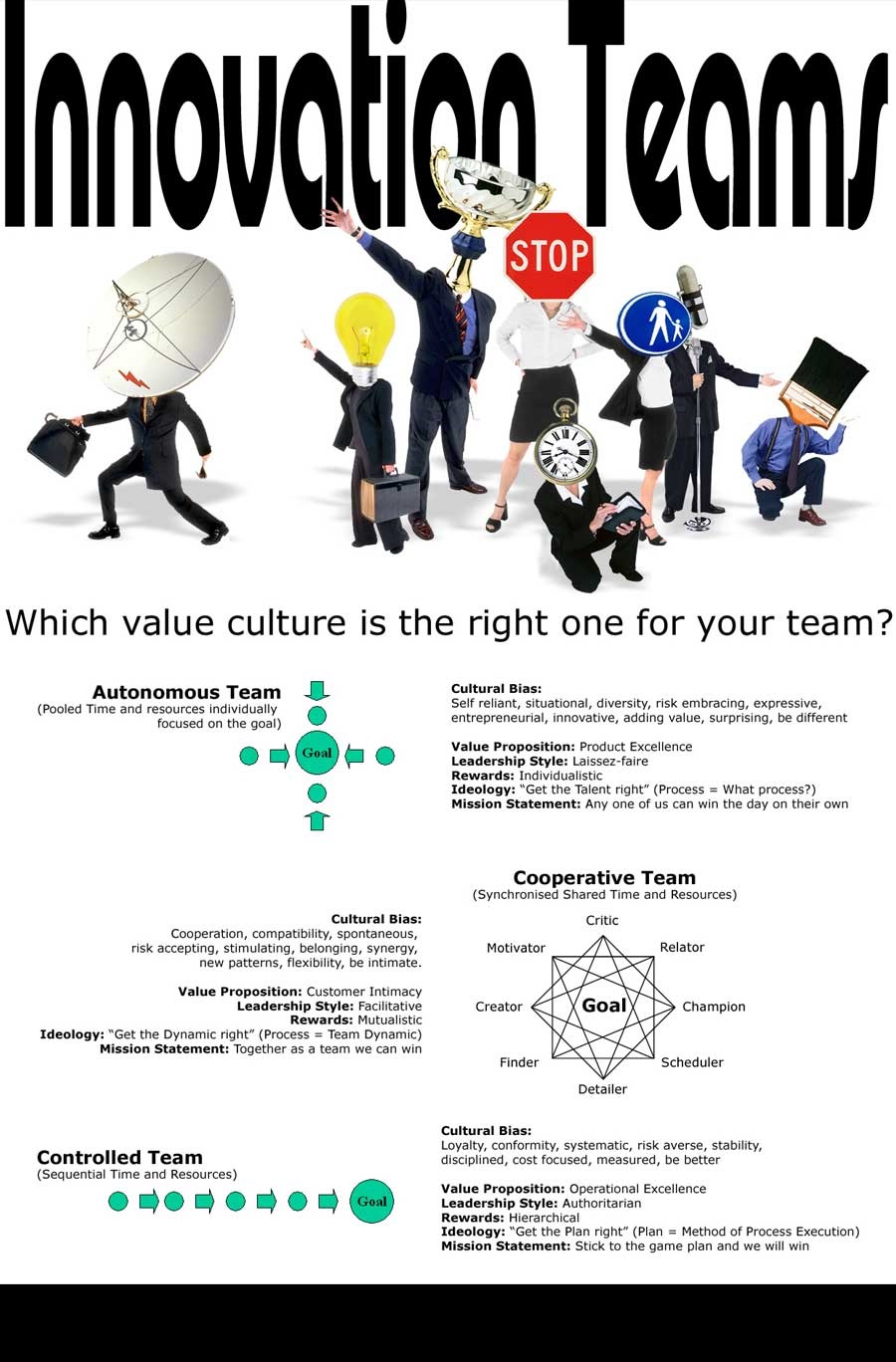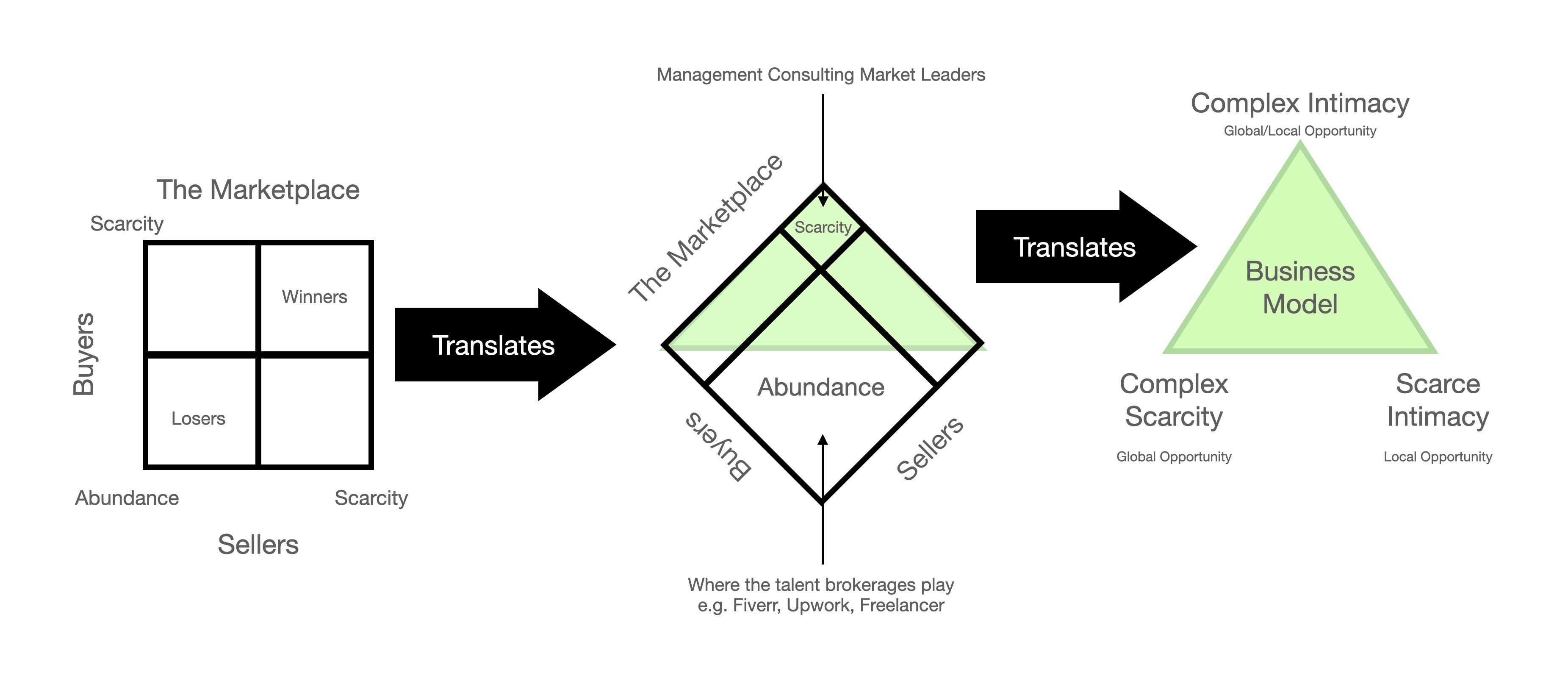I was talking with Thomas Fuhrman last night about my latest post on eCommerce being the most probable Web3 Use Case
The discussion drifted towards how difficult it is to scale the consulting services business model
and this led me to ask the question: Can we merge David Maister’s ideas about the Trusted Advisor with Treacy and Weirsema's Value Drivers to create a unified theory of the consulting business model?
What happens when we take the Practice Matrix and merge it with the Value Driver Triangle?
Well I suspect the logic flow looks something like this

which in turn references some very old ideas I had about innovation cultures

But let's put that aside for the moment and focus on the translation between boxes and triangles
The key insight that Treacy and Weirsema's Value Drivers brought to the table was market leaders deliver the industry benchmark on 2 out of the 3 value drivers and hit the third out of the park
For example Apple have a global supply chain and their retail stores but it is the design of their iProducts (be it phones, watches, earbuds, iPods, iMacs) that hit it out of the park and ensure they are the profit leader in their space
The key insight David Maister brought to the table was the idea of Consulting Groups shaping their organisational structure (what he described as leverage and what we today describe as flat vs vertical management structures) to maximise both their delivery capability and profit margin
Now the concept behind the value drivers can be stripped back to the simple idea that any business is an amalgam of people, systems and products
For example if you have smart systems or smart products you don't necessarily need rocket scientists to operate the business
But then again smart people can be inhibited by dumb systems and underwhelming products
So the objective is to achieve balance. Hit the benchmark on one and two and hit the third one out of the park. Do this and you will be the market leader
Sounds simple... but it's hard to do in practice... particularly in consulting services where the underlying assumption is everybody is competing on offering the smartest people
The assumption is wrong of course
Consulting services is awash with players both big and small leveraging one of the three value drivers as their home run
Take for example Accenture whose value driver is operational excellence vs McKinsey's product leadership
Accenture's model is a high volume/low margin - low intimacy/medium complexity arbitrage vs McKinsey's Low Volume/High Margin High Complexity/High Intimacy Arbitrage
The question in the front of mind for anyone entering or seeking to scale the consulting services model is fundamentally one of which quadrant do I want to play in?
As we have noted before a business model based on brokering smart people doesn't scale particularly well
They are expensive and in short supply
Meanwhile business models that employ dumb operators to operating dumb systems, or even better dumb technology, scale extremely well... again think: Accenture
The trap most consulting services models fall into is to confuse Customer Intimacy - ie their ability to change/tailor their offering to meet the customer's unique requirements - as their competitive edge
In the overwhelming majority of cases it is just the industry benchmark
Why? Most consulting engagements are tactical rather than strategic
and profiting from tactical engagements is about profiting from operational excellence rather than customer intimacy... Think: Accenture = evidence of the industry benchmark
and this brings me to the crux of why I suspect scaling consulting services models is so hard
We atune our collective thinking towards consulting services being all about billing out smart people to deliver smart solutions (generally in the form of of smart insights, processes and technologies)
When all the evidence is the overwhelming majority of consulting models build their reputations by brokering dumb methods, processes and techologies as smart operational insights and solutions to complex business problems
Which is to say the best consulting services models are the antithesis of the popular talent pool brokerages (again Accenture comes to mind)
Closing thoughts?
In the final model I've identified Complex Scarcity, Scare Intimacy and Complex Intimacy as the three consulting business models
Complex Intimacy is of course the apex of the profession
It's the space everybody imagines for their business
But it is also a space few have the talent, systems, technology or vision to break into, never mind challenge for leadership
In truth Scarce Intimacy is the natural home of the rainmakers
While Scarce Complexity is the natural home of the nerds
Conjoin the rainmakers with nerds and just maybe you'll end up with the Steve Jobs of consulting
But more on that next time... :)
For now understand this...
The journey from boxes to triangles can be condensed into this

and once you have made this connection between markets and models you can see why consulting models are so difficult to scale beyond their local confines
If you need to hit the industry benchmark on 2 out of the 3 value drivers then it is self evident that the limits to scale are not operational excellence or product leadership but customer intimacy
The reason being customer intimacy in consulting services is fundamentally a localised face to face activity
This why those organisations that have scaled globally essentially operate a localised account management best practice model coupled with remote operational efficiency and product leadership
The question moving forward is can virtualisation - be it video conferencing or metaversing - overcome the globalisation of customer intimacy challenge?
I guess only time will tell but the lesson here is the key to the consulting engagement is more often than not the customer is seeking intimacy over competency
But, having said that, I suspect AI/ML may render the question redundant moving forward
ie what happens when the CEO or CFO can type in a request to a virtual management consultant for "a new product Y launch strategy based on company X's product Z's launch strategy" or "the plan for an organisational restructuring of customer support channels based on company A's recent program B"?
... after all the hallmark of success with customer intimacy is recognising the customer is (more often than not) the smartest person in the room... so get out of the way and let them do the work
But more on that another day
Background reading
The Innovation Marketplace
The Business of Manufacturing Trust
The Agency of the Future?